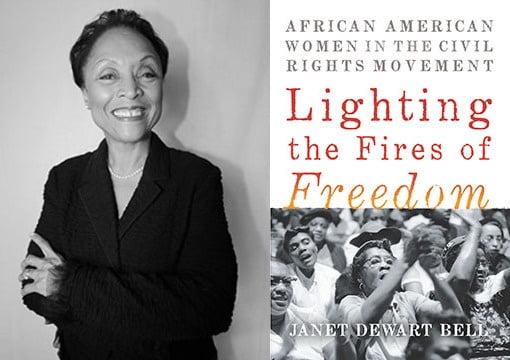Lighting the Fires of Freedom: African American Women in the Civil Rights Movement
by Janet Dewart Bell 08/19/2019Recommended by The New York Times, The Washington Post, Book Riot and Autostraddle
Nominated for a 50th NAACP IMAGE Award for Outstanding Literary Work – Debut Author.
A groundbreaking collection based on oral histories that plumbs the leadership of African American women in the twentieth-century fight for civil rights—many nearly lost to history—from the latest winner of the Studs and Ida Terkel Prize.
During the Civil Rights Movement, African American women did not stand on ceremony; they simply did the work that needed to be done. Yet despite their significant contributions at all levels of the movement, they remain mostly invisible to the larger public. Beyond Rosa Parks and Coretta Scott King, most Americans would be hard-pressed to name other leaders at the community, local, and national levels.
In Lighting the Fires of Freedom Janet Dewart Bell shines a light on women’s all-too-often overlooked achievements in the Movement. Through wide-ranging conversations with nine women, several now in their nineties with decades of untold stories, we hear what ignited and fueled their activism, as Bell vividly captures their inspiring voices. Lighting the Fires of Freedom offers these deeply personal and intimate accounts of extraordinary struggles for justice that resulted in profound social change, stories that are vital and relevant today.
A vital document for understanding the Civil Rights Movement, Lighting the Fires of Freedom is an enduring testament to the vitality of women’s leadership during one of the most dramatic periods of American history.
Introduction
The Civil Rights Movement was one of the most dramatic periods of American history, marked by
rapid and profound change. During this short span of time—from the 1950s to the 1970s—African
Americans led the fight to free this country from the vestiges of slavery and Jim Crow.
African American women played significant roles at all levels of the Civil Rights Movement, yet too often they
remain invisible to the larger public. While some African American women led causes and
organizations, such as Dorothy Height, the president of Delta Sigma Theta sorority and the National
Council of Negro Women, and Dovie Hudson, the NAACP president in Leake County, Mississippi,
others did not have titles or official roles. Cooks such as Georgia Gilmore organized to raise money to
support the Montgomery bus boycott. They didn’t stand on ceremony; they simply did the work that
needed to be done. They raised money and provided housing and solace—all without expectation of
personal gain. These often unnamed women helped to construct the cultural architecture for change.
African American women led a wide range of efforts to desegregate public accommodations and to
secure voting rights; they engaged in actions across a range of fields, including law, education, and
journalism.
Women leaders, such as the crusading anti-lynching journalist Ida B. Wells-Barnett and
Rosa Parks, whose courageous refusal to surrender her seat to a white person sparked the
Montgomery bus boycott, were also anti-rape activists, trying to protect black women from the white
southern tradition of “droit de seigneur,” literally, the “right of the lord.” In the antebellum and Jim
Crow South that meant black women’s lives and bodies did not matter; white men abused and raped
black women at will and without punishment. African American women leaders addressed the most
important and volatile issues of the times, from segregation to lynching, from education to economic
justice.




